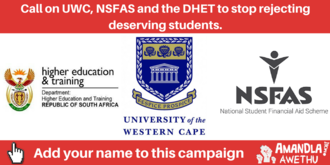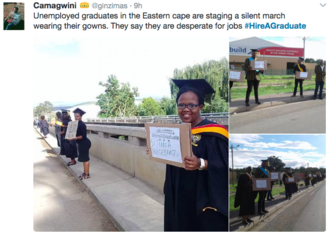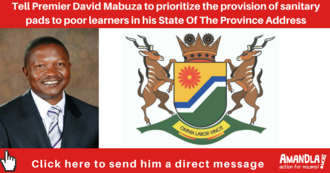- Featured
- Clean air
- Climate justice
- Consumer Rights
- Corporate Accountability
- Data access
- Early Childhood Development
- Economic fairness
- Education
- Electoral fairness
- Environmental justice
- Food justice
- Gender based violence
- Grants/social assistance
- Health
- Housing and infrastructure
- Industry interference
- Land Justice
- LGBTQIA+ rights
- Media/ information access
- Public transport
- Racism
- Reparations
- Safety
- Sanitation
- Service Delivery
- Sexual and Reproductive Rights
- Social justice
- Unemployment
- Womxn's rights/ gender equality
- Workers' rights
- More
-
Support the #UFSShutdownThese issues we raise relate to the academic, physical and socio-economic well being of students. The university is mandated to work on achieving these goals. Your support is required to pressure the university to take decisive actions in ensuring it does so. The university must declare no increment, a revised timetable, its support for our cause, the provision of free WiFi and the accreditation of student accommodation. We can no longer allow UFS students to be exposed to these issues.1,267 of 2,000 SignaturesCreated by Tshiamo Malatji
-
Remove Vetus Schola from CPUTAlthough there may be wide and reasonable disagreements with respect to both the goals and tactics of the student movement for free, quality and decolonised education, as well as the goals and tactics of university managements, the securitisation of campuses can never be an effective way of resolving differences. Such securitisation can and has already has caused bodily harm and trauma to protestors, by-standers, academics, support staff and security personnel themselves, while further exacerbating fear and mistrust, thereby polarising positions and undermining academic freedom. It is unreasonable and unsafe to expect students, academic staff and support staff to continue the academic project under these conditions. Moreover, it is antithetical to the pursuit of a negotiated solution that will enable the completion of the academic year successfully. Academics and concerned persons, please sign the petition with your name and affiliation.1,439 of 2,000 SignaturesCreated by Amandla.mobi Member
-
Stand up for inclusivity, support Tumi Morake.The comments made by Tumi are her reflection and interpretation of the structural effects of colonialism and apartheid that continue to plague majority of South Africans to this day. As post-apartheid South Africans that are interested in inclusivity and unity, we believe healing will truly happen when we acknowledge past wrongs, own up to the wrongs through restitutive justice, and actively support initiatives that seek to heal and unite us. The current social media onslaught, and the initiatives led by Afriforum and Solidarity to alienate and have Tumi Morake removed from the breakfast show, amongst other things, are not in the spirit of nation building and do not comprehend the spirit under which her comments were made. We petition Jacaranda FM and its shareholders to stand up for the ideals on which the new South Africa is built on which are progressive and inclusive thinking.2,144 of 3,000 SignaturesCreated by Thoba Vokwana
-
University cheque registrations for all Matriculants of MerafongThis is of importance because the Merafong Municipality has to give their word to the youth of Merafong and ensure that they reduce the levels of crime in our community particularly in Kokosi Location, because the youth there post their grade -12 most of them have no where to work and nothing better to do they therefore commit crime and the levels of teen girls pregnant is on the rise because their sub-conscious thinking/behavior has been manipulated that when they finish their grade-12 they will not be given the chance to also access higher learning. Therefore, the Municipality and the Mayor of Merafong has to assist the youth through education.53 of 100 SignaturesCreated by Dingaan Nzeke
-
UKZN Council and Executive must protect arrested students of UKZN PMBFrom 4 August 2017, we – the Arrested Students of UKZN-Pietermaritzburg – will stand trial as protestors of #FeesMustFall. Society applauds the youth for re-awakening the country to ongoing social injustice and inequity. The University agrees with free higher education and recognises the right to protest, yet they are not protecting us. If the courts try us, and find us guilty, we are the ones whose dreams and lives will be shattered. For the record; We DO support #FeesMustFall. We DO stand up for our rights and the rights of all South Africans. We DID help to build the ongoing broad movement for social justice in South Africa even after UKZN took out an interdict prohibiting us from freely doing so which means we are primarily charged with contempt of court among other charges. We are randomly accused for being generally a part of the climate at the time. We DID NOT burn buildings. We DID NOT assault anyone. While our University prides itself for being a transformative university that supports free higher education, those in authority are washing their hands of our fate. While the adults of society have the economic, institutional and legal power to protect us as the young of the society, they are instead looking away and doing nothing. If we are charged we will be blighted for life. Instead of emerging from university as graduates helping to make our society better, we will be branded as criminals that will make our degree status useless.280 of 300 SignaturesCreated by lihle mkhize
-
Place children with disabilities in schoolsThe South African Schools Act says that the governing body of a public school must determine the admission policy of that school. While this is the case, schools still turn away learners due to their disabilities and special needs [1]. The Act further says that no learner should be put on the waiting list; their names are supposed to be placed on a central database if schools cannot accommodate them. It also states that all children between the ages of 5 and 15 have to go to school, this includes children with disabilities and special needs. The Constitution, the National Development Plan, the Sustainable Development Goals, and the Incheon Declaration of the World Education Forum all confirm that the state has a commitment to provide schooling for children with disabilities. The Department of Basic Education needs to ensure that the Act is adhered to, and that governing bodies do not violate the children's rights to an inclusive and special education. [1] Disabled and out of school, Stephanie Kelly for Groundup News. 13 June 2016.49 of 100 SignaturesCreated by Amandla.mobi Member
-
PMB GHS, act against racismRacism should not be tolerated, ever. There is no excuse. Real and permanent changes must be made. Read more about the incident here: https://www.thedailyvox.co.za/racism-thrives-at-pietermaritzburg-girls-high-school-ndapwa-alweendo/1,268 of 2,000 SignaturesCreated by Zama Nzimande
-
Introduce Khoekhoe language as an additional languageThe indigenous Khoesan communities are amongst the very first inhabitants of South Africa. Yet after 23 years SA still does not have a single Khoesan language recognised as an official language. We demand that this be rectified and that the Khoekhoe language be introduced as an additional language in South African schools.80 of 100 SignaturesCreated by Denver Plaatjies
-
Send a message to the Fees Commission*Our leaders had a year to meet the demands of Fees Must Fall, and they have failed. But we have an opportunity to change this. This time last year we didn't have the ‘no-fee’ varsity report released, or had commitments from government to address illicit financial flows, but this year we do. That’s why we are calling for Minister Nzimande to stop stalling and implement his own no-fee varsity report, and for Minister Gigaba to commit at least 1% of Mzansi’s GDP to higher education. In October 2015, thousands of amandla.mobi members rallied together and forced Minister Nzimande to release the No-Fees Varsity Report. The report sets out 12 recommendations showing how free university education for students from low income households can be provided [1]. This affirms the demands of the student movement collectively known as ‘Fees Must Fall’ and proves that the Minister can take decisive action to put an end to financial exclusion in higher education. Since the release of the report we have been pushing to shift the public debate towards calls for Minister Nzimande to progressively implement the recommendations of the report. The time to stop overlooking us has come! Academics have spoken out on the chronic underfunding of Mzansi’s universities [2]. In fact, Mzansi’s government spends below the continent’s average on higher education, at 0.75% of its GDP. The proportion of GDP for Senegal and Ghana is 1.4% [3]. Mzansi’s higher education budget for the 2015/16 financial year is R30 billion. If the government were to spend 1% of GDP on higher education, this would amount to R41 billion. That’s almost four times the reported shortfall caused by 2016’s freeze on fee increases [3]. The recommendation by the Department of Higher Education and Training that university fees for 2017 should not be increased by more than 8% is in stark contrast to the events of last year where the government instructed universities on what to do. It is an open invitation for universities to determine what margin they increase fees by, provided that they remain within the Minister Nzimande’s recommendation. We need to shift the focus back to addressing the chronic underspending on the country’s universities. [1] It’s a national crisis, academics tell Nzimande, News24. Oct 22, 2015. [2] Free education is possible if South Africa moves beyond smoke and mirrors, Salim Vally for The Conversation. Sep 21, 2016. * The information you submit will be sent to the Fees Commission, the Presidency and the Department for Higher Education.323 of 400 SignaturesCreated by Amandla.mobi Member
-
Assist Students Depending on NSFASThe University of the Western Cape Financial aid office is deliberately declining NSFAS funding for senior students who have passed 50% or more of their 2016 modules. According to NSFAS website and press releases, all students who were funded in 2016 and have passed 50% or more of their 2016 modules qualify for funding. The University of the Western Cape is saying otherwise. On 6 February 2017 Universities South Africa (USAf) issued a statement saying "students at all universities may be assured that notwithstanding the challenges experienced by NSFAS, the vast majority of students who qualify for grants will be able to register this week if they have not already done so." Fast forward to 21 March 2017 and there are confirmed cases of students at the University of Western Cape (UWC) and Durban University of technology (DUT) who are yet to register despite meeting the criteria to qualify for NSFAS. According to a commitment made by NSFAS in 2017, all first-entry students who have applied for financial aid and who come from Quintile 1, 2 and 3 schools (least privileged schools) and / or where family income is dependent upon a South African Social Security Agency (SASSA) grant, qualify for financial aid. These students may, with minimal risk to universities, be admitted to the study programme for which they qualify (subject to availability of space), and also to a place of residence (subject to capacity considerations). With regard to returning students, NSFAS has undertaken to support in 2017, all students who: * Received financial aid in 2016; * Satisfied the 50% module pass requirement; * Satisfy the N+2 completion requirement; and * Have signed their 2016 NSFAS loan agreement forms.129 of 200 SignaturesCreated by Amandla.mobi Member
-
Hire a graduate, even if they don't have experienceWe can't get jobs because we lack experience, we are suffering.1,201 of 2,000 SignaturesCreated by Phumelele Hlongwane
-
Prioritize sustainable provision of sanitary pads in quintile 1-3 schools in MpumalangaOn average in Mzansi. a girl will miss 60 days of school because of her period [1]. And some are forced to use socks, newspapers and worse because they can’t afford sanitary pads. Over time this can cause girls to drop-out completely. If they struggle through, they often find themselves unable to fully take part in school activities. Last year, we watched as Parliament introduced Max, the flavoured condoms. While efforts aimed at reducing the rate of HIV/AIDS are commendable, we cannot ignore the plight of the girl child who loses her dignity and time for her studies for something she cannot opt out on. “You have to enable that child to go to school every day because the concern is that women are illiterate. If (not having access to) sanitary towels make girls not go to school, it should be your primary concern” ANC MP Patricia Chueu. [1] Dignity Dreams article with information on how many girls miss school a month and in a year: http://www.ngopulse.org/organisation/dignity-dreams5 of 100 SignaturesCreated by Amandla.mobi Member
.png)

.png)


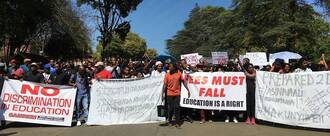
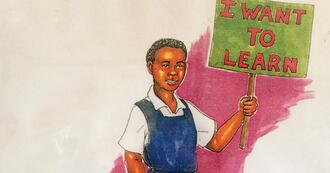
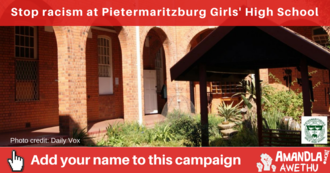
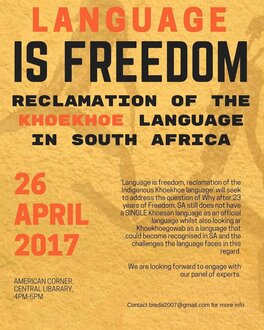
.png)
